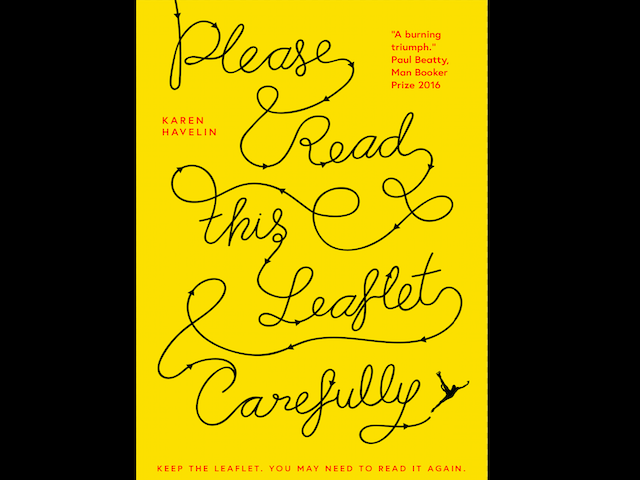Angèle Eliane reviews Please Read This Leaflet Carefully by Karen Havelin.
It’s hard for me to read about pain, but how tough is it to write about it?
This simple statement sums up one of the important messages Karen Havelin gives us through Please Read This Leaflet Carefully. We wince at pain; we close our eyes in front of others’ suffering; we wish for silence when they beg for screams.
In giving us a glimpse of living with endometriosis, a long-term condition which not only causes fertility issues but also chronic pain, fragmenting the body into pieces, Havelin collects these pieces with the help of her book, putting her body back together. We can all relate to her experience in many aspects, although her condition is often an isolating one.
As cliché as it might sound, there is strength in Havelin’s writing. I won’t talk about courage because this would almost be an insult, as Havelin took from her own experience to tell this story. Her strength has made me want to put the book down as many times as I’ve wanted to pick it up. She made me want to acknowledge pain, especially one woman’s pain and relate to one experience to stop sometimes dismissing others.
Women’s pain is often set aside. There are still so many ways in which levels of estrogen and progesterone control women which we don’t know about but still, many men and women remain unaware. Leslie Jamison writes to a friend, in The Empathy Exams: “I’ve got this double-edged shame and indignations about my bodily ills and aliments-jaw, punched nose, fast heart, broken foot, etc, etc, etc. On one hand, I’m like, Why does this shit keep happening to me? And on the other hand I’m like, Why the fuck do I keep talking about it?”
Chronic pain reveals a whole new world, opening up a truth about women. The question could easily be: what makes you want to read about it? It’s easier to refuse to our imagination to become a sick body. We sometimes don’t wish to challenge our perception of pain. Truth be told, it was also why I chose not to stop reading. I have put down too many readings to stop myself from finding out more about illness. In others words, to stop myself from feeling bad and wishing for it never to happen to me.
The results of Please Read This Leaflet Carefully are raw truth, the kind I rarely hear from. With no pretension, Havelin took me through the everyday life of Laura, the character narrating this form of auto-fiction. Whilst the book is not about despair, it makes it necessary to understand that others cannot relate to the pain the character is in. In a world where no one wants to see the sick walking among them, Laura often struggles with her own relationships. Her divorce is a reminder that there is a disconnect between her and her ex-husband: “In my mind, the failure of our marriage hinged on him giving in to the temptation of secretly believing my illness was my fault. That there was some abstract, heroic, grand gesture to be performed, but I refused to do it. He would resist the drudgery of the ongoing pain by thinking that if the roles were reversed, he would have solved it all, somehow.” Havelin navigates between many topics: being a woman, being ill, understanding parents, raising a child as a single mother, fighting with the medical system, and going through a divorce. The book felt like I turned into an empath as Laura described with accurate detail how others make her feel, whilst always acknowledging the secondary character’s feelings.
As she follows the different aspects of Laura’s life, Havelin leaves me with another taste in the mouth rather than the bitter one associated with pain. She intertwines Laura’s life with the other characters, avoiding the book to fall into the trap of solitude, which truthfully surrounds sickness. Female interaction is also widely present when the dismissal of pain reappears. It’s not only men who don’t understand, Laura but women too, along with her own mother: “The situation was not hopeless, because my mother could always produce some way that I should have known better or could have acted better to avoid getting sick. There was no need to panic, because the next time it would be different. Pretending my health was in my power and not so bad anyway may have been necessary for our survival, but it was still less than ideal for the most vulnerable party—me.”
As well as the incipit, “For years, I’ve considered it an established fact that the female body is a pain in the ass.”, the book is dotted with how easy it can be to think that someone’s pain is in their own hands. Whilst the careless tone of the first sentence is at odds with the subject, it soon becomes clear that the subject matter is a serious one and resonates with all women, making it more than a book about endometriosis.
The narrative takes an interesting toll in the way it’s constructed, which can sometimes be hard to follow between the New York and Norway scenes, the after and before divorce or the quotes about ice skating but it’s easy to look over these small mishaps when the writing is so powerful: “Children are of the moment. Either you’re there with them or you’re not.” Many of these simple and universal truths are scattered throughout the book. They strike a chord and empower Havelin’s writing.
Havelin manages to change the game about the idea of a book dealing with women, pain, hospital beds and endometriosis. When putting down Please Read this Leaflet Carefully, I remember Havelin’s honesty, not the pain. If I sometimes got confused with the timeline, I can perhaps link it to the idea that suffering makes you obliterate small details such as time frame, “They’re not so much dreams as time travel. I’m back there, strapped in and spread-eagled on the table, half lit room with the nurses busy around me, getting the needles and my arms ready for the anesthesia.” The images keep coming back, but time slips away when Laura is lying in a hospital bed.
Living with chronic pain is never over. In an interview given to The Millions, Havelin describes it as depicting “Laura’s pain and how it’s still there even at points when she’s doing “better.” Havelin underlines with subtlety a world where women are not equal to men in the eyes of doctors, assembling the imaginary of the hysterical woman and doctor-knows-best: “Doctors barely hear what you say. They watch your demeanor and listen for the tone of your voice.”. The experience is real but also followed by a wider question perpetrated by Laura: “Is it like this for men, too?”
In making Please Read This Leaflet Carefully about acceptance, hope and empathy, Havelin stresses the importance of speaking up as a woman. She delivers words about one of the many experiences I needed to read, and that we clearly all need to read, more about.
Please Read This Leaflet Carefully by Karen Havelin is published by Dead Ink Books.

